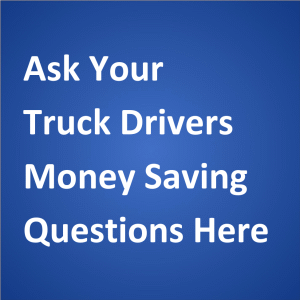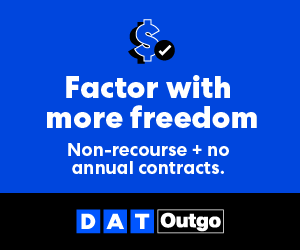By: RC,
 What is the best way for a company truck driver to pay for things like clothes, food, showers, magazines, etc.? I would like to find a way to carry no money. Perhaps a credit card or debit card? While out on the road I want to carry as little money as possible yet still able to purchase things. What in your opinion is the best way to do this?
What is the best way for a company truck driver to pay for things like clothes, food, showers, magazines, etc.? I would like to find a way to carry no money. Perhaps a credit card or debit card? While out on the road I want to carry as little money as possible yet still able to purchase things. What in your opinion is the best way to do this?
—–
Vicki’s Reply:
Hello,
We appreciate your question.
While driving professionally, my husband Mike and I have only ever been company drivers, so we understand where you’re coming from. Our experience may not be the final answer on this question, so we are open to listening to others on this subject. However, here is our take on paying for things on the road.
1. There are at least four payment options open to professional truck drivers who have the required resources: cash, credit card, debit card and Comdata card.
* The cash method requires that you have some on you. There are some instances, however, in which you cannot use cash to make a purchase, such as when renting a car. So be aware of this.
* The credit card assumes you have an account in good standing that can be used everywhere you want to use it. Mike notes that he has seen notices (although he can’t remember where he’s seen them) that if a customer uses a credit card, there is a $5 minimum purchase. Obviously, you will not want to buy anything less than $5 (like a cheaper magazine) at a place like this as the balance will be like a fee to you. It’s also possible that if you want to buy something less than $5 and use a credit card, the merchant won’t accept the card as payment. We’ve never tried this, so we don’t know how it works.
* The debit card assumes that you have a bank account with sufficient funds in it to cover your purchases and is accepted everywhere you want to use it.
* The Comdata card, most likely provided by your company, should be treated as cash and can only be used if you have funds in the account. Truck stops may accept a Comdata card like a debit card, but we haven’t verified this. Please check your company’s policy regarding Comdata card use and exactly what you are permitted to use it for — before you use it. Some drivers prefer to have their paychecks loaded onto their Comdata cards instead of having them direct deposited into a bank account or mailed home. Mike’s trucking company does not send checks through the mail. Drivers there can choose to have part or all of their checks loaded onto their Comdata cards.
2. There are also pre-paid cards, some of which can be charged over and over again, but you have to be very careful about the fine print because the fees and charges can eat your account balance in a hurry. (I couldn’t believe what I read on the back of the package of one such card sold in a truck stop!) Depending on the issuer of the pre-paid card, it may or may not be accepted everywhere you want to use it.
3. Personally, we prefer having a “truck fund” to pay for things on the road like showers we can’t get for free, CAT scale tickets, tolls that Mike’s company-issued E-ZPass doesn’t pay for, and incidentals that are truck-related (like gloves). Mike uses a credit card for higher ticket truck products like load locks, and always makes sure, for reimbursement purposes, that he gets a receipt so that he can turn it in with his load paperwork to match with the P.O. (purchase order) number that he gets from his driver manager as soon as the purchase is made.
4. We have some cash to pay for personal things but mostly use a credit card for shopping and restaurant meals on the road. We are very careful to pay off the credit card ASAP so that no interest charges accrue. Our preference is to use a credit card that provides a cash back bonus based on our usage. (We plan to write a page for our website on that soon.) It is also the wise driver who has an emergency fund in place in case there is a time of great need.
You asked what is the “best” way for company drivers to pay for things on the road. Part of the “best” way is personal preference; another part is the resources that a driver has at his/her disposal. No matter how a driver pays for things, he/she should strive to buy things in accordance with his/her budget. Good record keeping and money management are essential, especially so that we can properly itemize at tax time.
We do not recommend that you take absolutely no cash with you on the road. You may wish to segregate your spending into personal versus job-related, such as using one card for the former and a different card for the latter.
Although this instance involved our personal car, I was well aware of the need to carry cash with me the day that I accidentally locked my keys inside with the engine running! (All I was doing was making a quick pick-up of something that belonged to me on the side of the road; but by rote, I flipped the switch to the locked position upon exiting the car.) How embarrassing — and expensive! The locksmith charged me $45 cash on the spot or else he would follow me to the nearest ATM. Imagine that kind of situation out on the road, far from a bank. You can’t use a credit card in situations like that.
We trust that this information has been helpful.
For more resources from our site, please see
Budgeting, Emergency Fund and Money Management.
Best regards,
Vicki Simons







